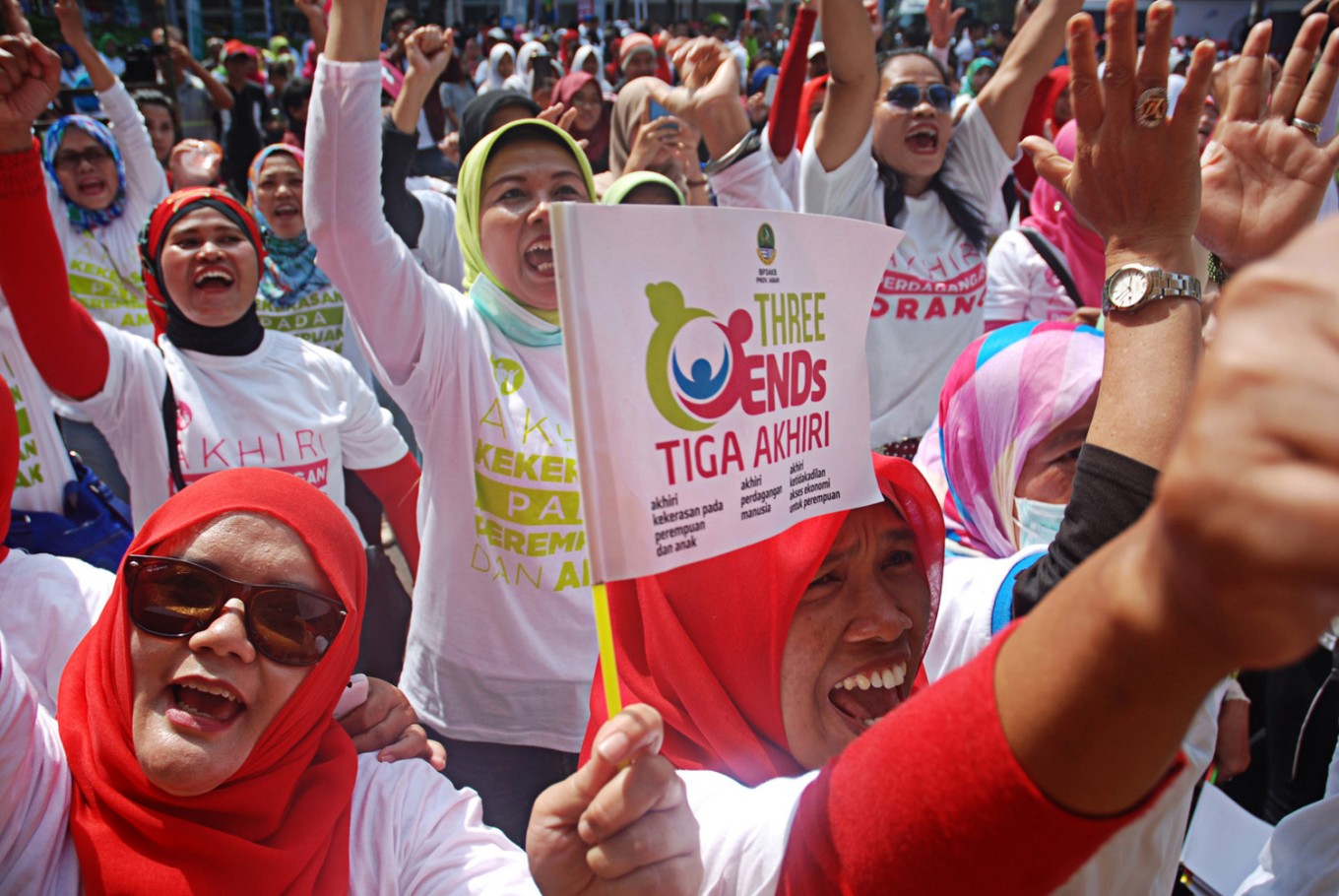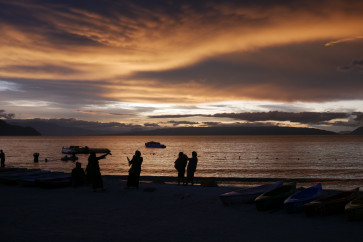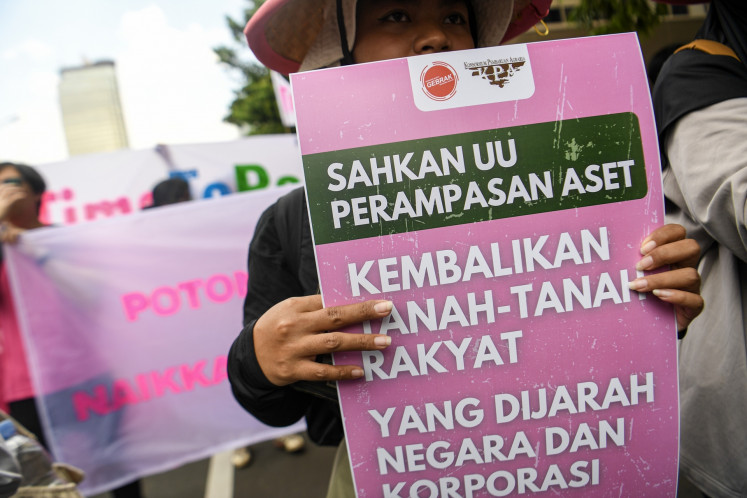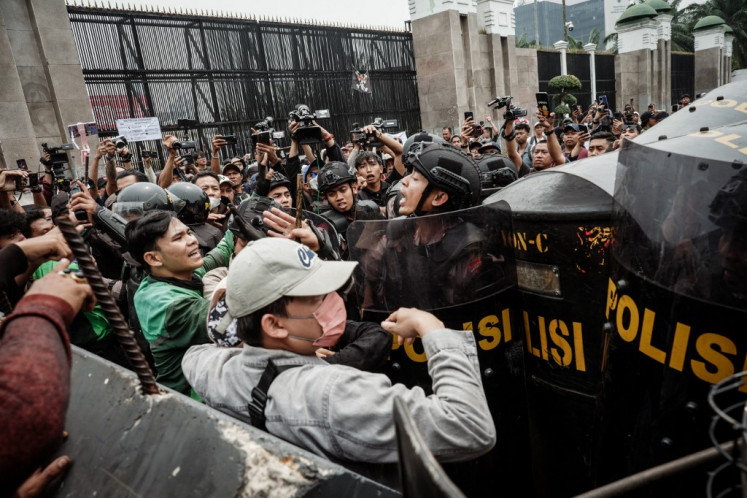Popular Reads
Top Results
Can't find what you're looking for?
View all search resultsPopular Reads
Top Results
Can't find what you're looking for?
View all search resultsMother’s Day or Women’s Day — does it really matter?
Indonesian Mother’s Day originally meant to honor women’s struggle, not just motherhood. Most Indonesians unaware of history behind it, consider Dec. 22 day to honor mothers only.
Change text size
Gift Premium Articles
to Anyone
 Against violence – Housewives participate in the peak celebration of Three Ends Expedition at City Hall in Bandung, West Java, on Nov.20. Initiated by the Women’s Empowerment and Child Protection Ministry, the Three Ends Expedition aims to campaign the eradication of violence against women and children.
(Antara/Fahrul Jayadiputra)
Against violence – Housewives participate in the peak celebration of Three Ends Expedition at City Hall in Bandung, West Java, on Nov.20. Initiated by the Women’s Empowerment and Child Protection Ministry, the Three Ends Expedition aims to campaign the eradication of violence against women and children.
(Antara/Fahrul Jayadiputra)
Since he was still in primary school, 32-year old Ivan Sinaga has always wished his mother Happy Mother’s Day on Dec. 22.
That date is special for Ivan, as it is also his mother’s birthday. “I often bought her gifts and took her out for dinner to celebrate both her birthday and Mother’s Day,” said Ivan, whose job as an aid worker requires him to travel overseas a lot.
Ivan, who is now posted in South Sudan, admitted that he did not know why Dec. 22 is known as Mother’s Day, neither was he aware of the fact that some people, including feminists, argued the day should be called Women’s Day instead.
Dec. 22 is an important date for Indonesian women’s activists. It marked the beginning of their political and cultural struggle to achieve equality when a group of pioneering women gathered together in 1928 to hold the first congress of Indonesian women in Yogyakarta. The congress had two goals: to improve women’s role in society and support the independence movement.
In 1938, when Indonesian women held their third congress in Bandung, Dec. 22 was formally recognized as a milestone in the country’s women’s movement. It was also for the first time called Hari Ibu, or Mother’s Day, even though it commemorated Indonesia’s women’s movement and was not limited to motherhood.
In 1959, then-president Sukarno declared Dec. 22 a national day to honor Indonesian women, but things changed when former president Soeharto took power in 1966. Under the New Order regime, the meaning of Hari Ibu gradually changed into Mother’s Day, as the day to honor motherhood.
People have grown accustomed to calling Dec. 22 Mother’s Day and have forgotten the history behind it.
This year, with the support of @buibuksocmed, an account established to support mothers and share parenting ideas by a number of young mothers and social media activists, Twitter Indonesia launched a special emoticon to commemorate Mother’s Day.
The heart-shaped emoticon will be generated if someone keys in #HariIbu, #KisahIbu or #RangkulIbu when posting a comment on Twitter. The hashtags can also be used for sharing ideas on parenting or sweet memories with mothers.
Milly Shafiq, one of the mothers who initiated @buibuksocmed, said not only mothers, but women in general were welcome to participate and celebrate Mother’s Day.
Although not everyone knows the history behind the day and whether or not the meaning has slightly shifted, Milly said “what is important is that the spirit is still the same, that [as a mother or a woman] we are also human beings trying to contribute to society.”
Milly admitted that she once knew the history behind the day but had since forgotten it.
Present-day Hari Ibu celebrations often involve vendors, like restaurants offering discounts for mothers.
App-based transportation company Uber will give away special gifts for mothers for free, like flowers and cosmetics, and even hotel vouchers on Thursday from 1 p.m. to 4 p.m., just like last year.
Google Indonesia recognized Mother’s Day by displaying a theme-specific doodle of Mother’s Day on its website in 2014 and 2015.
Women’s activists beg to differ, saying Dec. 22 should be more than just a day to honor mothers. Adriana Venny Aryani of the National Commission on Violence against Women (Komnas Perempuan) lamented the fact that only few people know that Dec. 22 was intended to be a day to commemorate women’s struggle.
“We still have a lot of homework to do in terms of female empowerment. The role of the mother should also reflect the role of the woman [in a broader context] in terms of efforts to take part in building the country,” she said.
This year’s World Economic Forum’s (WEF) Global Gender Gap Report finds that Indonesia ranks 88th out of 144 countries studied. In the ASEAN region, Indonesia lags behind the Philippines, which ranks 7, Laos (43), Singapore (55), Vietnam (65) and Thailand (71) in the annual report measuring the extent of gender inequality in four broad areas, namely economic participation and opportunities, educational attainment, political empowerment as well as health and survival.
Indonesia received an overall score of 0.682 this year, improving from 0.654 in 2006, on a scale of 0 to 1, with 1 pointing to perfect equality and 0 to extreme inequality. No country in the world has achieved gender equality; not even Iceland, which tops the list with a score of 0.874, Dian Kartikasari, secretary-general at prominent women group the Indonesian Women Coalition for Justice and Democracy (KPI), said.









